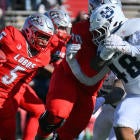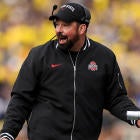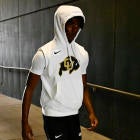Kent State has fired head football strength and conditioning coach Ross Bowsher after determining that he provided the school with false information about certification necessary to hold his position. This was uncovered by the university as part of a review following a CBS Sports investigation that was unable to find certification for Bowsher, who was in charge of a June 13 workout at which 19-year-old football player Tyler Heintz died.
The university released the following statement to CBS Sports on Monday afternoon in response to our Aug. 8 report.
The safety and well-being of our student-athletes is paramount at Kent State University, and we have continued to assess and review all policies and circumstances relative to the June 13 summer football workout that occurred prior to the death of Tyler Heintz. We continue to mourn the loss of Tyler, and the Kent State family is focused on joining with the Heintz family in honoring his memory in our thoughts and actions.
The university has concluded its internal review of the matter, and our findings indicate that the workout was conducted in accordance with national protocols for student-athlete health and safety, and the session was supervised appropriately by qualified personnel. Present at the June 13 football workout were five certified personnel who participated in the design, implementation and supervision of the 20 student-athletes.
During the course of the review, it was discovered that football strength and conditioning coach Ross Bowsher provided false information about his certification, which is required by the university and the NCAA. Mr. Bowsher has been dismissed from the university, and we are self-reporting this decision to the NCAA.
Bowsher, who was beginning his second year with the program, appears to be the only member of the strength and conditioning and training staffs without certification, CBS Sports learned through our investigation.
If Bowsher is indeed not certified, that would be a violation of NCAA Bylaw 11.1.5, which states that strength coaches "must maintain current certification through a nationally accredited strength and conditioning certification program." Kent State told CBS Sports it will self-report the violation to the NCAA.
Bowsher was responsible at the time for supervised drills on June 13 when Heintz collapsed during the second day of conditioning. The preliminary cause of death by a local coroner was hyperthermia, a condition that develops when the body is unable to properly cool itself. An official cause of death will take a few more weeks, according to the Portage County Coroner's office. A spokesman for the office told CBS Sports that hyperthermia "is more than heat exhaustion."
When CBS Sports initially contacted Kent State athletic director Joel Nielsen for comment, a university spokesman said the school was continuing "to assess and review all policies and practices relative to the circumstances surrounding Tyler's death." The statement went on: "It is premature to report the totality of our findings, but we remain steadfast in the due diligence of our review and our commitment to the safety and well-being of all student-athletes at Kent State University."
Typically, strength coaches lead drills during the offseason when players' interaction with the coaching staff is limited. Players train through noncontact drills in T-shirts and shorts.
Heintz became the 35th college football player across all divisions to die since 2000, according to updated research done by Oklahoma head trainer Scott Anderson. Only six of those were traumatic deaths, occurring outside preseason conditioning or offseason drills.
Factors relating to overexertion have become the leading cause of death for college football players since the beginning of the century.
Almost immediately after Heintz's death, both major strength and conditioning certification bodies reached out to CBS Sports to relay the fact Bowsher was not a member. The National Strength and Conditioning Association (NSCA) and Collegiate Strength and Conditioning Coaches Association (CSCCa) account for a combined 29,000 members.
"Today, the way liability is, if you're not certified by an accredited organization you're walking on thin ice," CSCCa executive director Chuck Stiggins said. "Lawsuits could be $20 million-$30 million dollars. I can't imagine hiring someone without the appropriate credentials."
While the school could not produce the certifications for Bowsher when first asked by CBS Sports, four subordinates under Bowsher were listed as members on the CSCCa membership site. It is possible for membership in both those national bodies to lapse, but during that time, strength coaches are not considered certified.
The NCAA has only required that strength coaches be certified since 2015. Since then, major sanctioning bodies have urged the NCAA for more strict guidelines. The association has suggested state licensing or a registry from which a pool of qualified candidates could be hired.
Those sanctioning bodies argue NCAA certification is too easy, allowing underqualified or unqualified coaches into programs. "[The NCAA doesn't] want to take anybody's side," Stiggins said.
A previous CBS Sports investigation found in March that Oregon's football strength coach had only a track and field certification at the time three Oregon players were hospitalized after strenuous workouts.
While that coach was technically in compliance with NCAA rules, Irele Oderinde was suspended by Oregon. Four industry experts totaling 100 years of experience said they didn't consider Oderinde properly certified to be a football strength coach.
"Football has a problem," NSCA coaching education manager Scott Caulfield said. "... Typically they hire the biggest dude that lifted weights and make him the strength coach. A lot of times they don't care if he is certified or not."
Bowsher was hired from Arkansas Tech in January 2016 after serving as an assistant at Purdue. According to the Kent State website, Bowsher completed a certification program at Indiana University Purdue University-Indianapolis.
An IUPUI official told CBS Sports the school offers a personal trainer certificate program that prepares students to take national strength and conditioning certification tests, including that from the NSCA. To be clear, that IUPUI class is not national certification. In fact, the NCAA requires any certification must be accredited by the National Commission For Certifying Agencies.
CBS Sports attempted to verify Bowsher's degree and the certification class prior to publishing our investigation on Aug 8. IUPUI said it could not comply due to privacy laws. Bowsher did not respond to a request for comment.





















